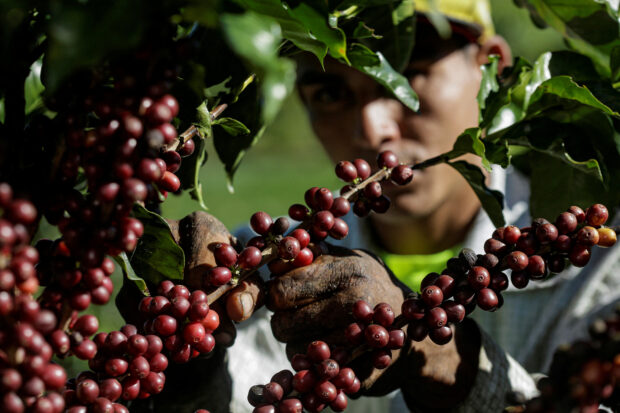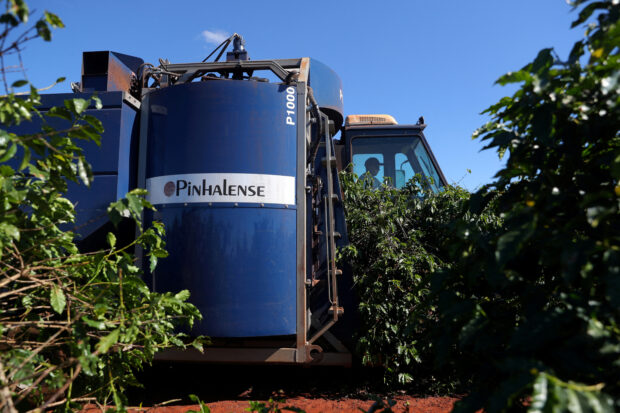Brazil ‘natural’ coffee hits premium market in challenge for small farmers

A worker picks ripe coffee cherries at a coffee plantation, in Grecia, Costa Rica Jan 9, 2020. REUTERS/Juan Carlos Ulate/File photo
LONDON/TEGUCIGALPA, Honduras – Arabica coffee from Brazil usually rated lower grade has arrived in big volumes on the world’s main price-setting market, traders said, in a fresh challenge for hand-picked premium beans from less efficient, smaller farms elsewhere in Latin America and Africa.
Agricultural powerhouse Brazil grows almost half the world’s arabica, much of it harvested by machine on large plantations. But some of its beans, known as unwashed or ‘natural’ arabicas, have not previously been used for high-end benchmark coffee contracts around the world.
Now, global traders are adding these increasingly tasty Brazilian beans to the bags used to settle these contracts, five traders told Reuters, marking a previously unreported structural change set to weigh on world coffee prices in the long-term, the traders and four others in the industry said.
Brazil’s coffee exporters association Cecafe confirmed these beans were now being included in exchange stocks, saying it was in recognition of their improved taste and quality.
The Intercontinental Exchange (ICE) did not answer a question about whether it was aware of the change in the types of beans backing its contracts, but said the exchange’s grading process was designed to protect standards.
“Samples that present an unwashed flavor in the cup will fail grading”, ICE said in a statement.

An agricultural machine harvests coffee in a plantation in the town of Sao Joao da Boa Vista, Brazil June 6, 2019. REUTERS/Amanda Perobelli/File photo
While the news could bring welcome relief to taste-conscious consumers battling food price inflation, it spells more gloom on long-struggling Latin American and African farms where coffee trees grow on steep, shaded slopes unsuitable for Brazilian-style harvesting vehicles.
“We are in danger”, said Dagoberto Suazo, president of the Central de Cooperativas Cafetaleras in Honduras, asked by Reuters about the new development.
“Producers in Honduras are 95 percent small scale. It’s not that we’re going to disappear, but poverty is going to increase”, he said.
‘If it walks like a duck’
The Coffee C Futures contract on the ICE exchange has traditionally reflected premium grade coffee, known as washed arabica because of a technique using water to remove coffee’s red fruit from the bean.
Washed beans from Africa, Colombia, Central America and Peru have long been valued for superior flavor. Over time, however, Brazilian farmers have improved the taste of their unwashed and semi-washed coffee.
Late last year, significant volumes of Brazil’s unwashed grades started to appear along with semi-washed grades in bags sent to the exchange so they can be used to settle its contracts, four of the traders said. The traders declined to be identified as they were not authorized to speak to the media.
Currently about 30 percent of approved stock sitting in ICE warehouses comes from Brazil, data shows. The four traders estimated that almost all those bags include unwashed grades, and one trader said some bags contain almost entirely unwashed.
Although ICE price contracts are meant to represent the value of premium-grade arabicas, its rules do not expressly forbid officials from approving unwashed arabicas for contract settlement.
They simply state that approved beans should be free from ‘unwashed flavours’. Unwashed coffee is so-called because its fruit is left to dry whole before the bean is extracted.
Given that ICE officials approve beans mainly on the basis of taste, they are often unable to detect ‘unwashed flavours’ in the best of Brazil’s lower grade arabicas, especially if they’re mixed with premium grades, a Europe-based coffee market expert working for a leading trade house said.
“It’s very difficult to pick a top-of-the-range unwashed from a semi-washed. If it walks like a duck and quacks like a duck then, erm, it’s a duck,” a veteran Swiss-based global coffee trader said.
Marcio Ferreira, president of Brazil’s coffee exporters association Cecafe said the quality and sustainability of all Brazilian coffees have been improving for years.
“ICE has their standards established for each origin and each lot is subject to quality approval,” he said. “We understand that if each lot has its quality approved … it is because it fits established quality parameters”, Ferreira said.
He added that relatively little Brazilian coffee ends up in ICE warehouses because it usually fetches higher prices in the physical markets.
Most ICE-certified arabica is owned by leading global trade houses Sucafina and Louis Dreyfus, the five traders said.
The two companies declined to comment on whether they had got a mix of semi-washed and unwashed beans certified by ICE. A source at Sucafina said it had only shipped 100% semi-washed coffee to the exchange for certification.
Latent threat
The large-scale arrival of Brazilian beans at ICE warehouses has been a latent threat for arabica producers since 2013, when the exchange first allowed semi-premium beans from Brazil to be used to settle its premium grade arabica contracts.
This surge initially didn’t come to pass because there was not much spare premium coffee around so traders were able to get higher prices selling even semi-premium beans to roasters in the physical markets.
Starting in 2020, however, Brazilian beans began to arrive en masse and then, in late 2022, they came despite the fact that semi-premium grades were at the time fetching higher prices in the physical markets.
This led some traders to suspect that cheaper unwashed beans had been mixed in, three of the traders said, adding they had confirmed the suspicions with counterparts in Brazil.
ICE – a market of last resort where excess coffee is guaranteed to fetch a price – releases daily stocks data on how many bags of beans approved for settling out price contracts it holds.
Given this tally – seen as a proxy for excess global coffee supply – is visible to all, ICE contracts usually come under pressure when the amount of stock that backs them increases.
“The market needs to realise that we could see, (in) years of surplus, lots of (mixed grade) Brazils come to the exchange,” said the Europe-based coffee market expert.
Stagnating for years
Despite a growing world population that is increasingly keen on coffee, especially premium-grade arabicas, output of this grade in top producer Central America has been stagnating since around the turn of the century.
Much of the reason for this has to do with price.
According to Reuters data, ICE arabica price futures traded at around $1.75 per lb in early 1980, more than 10 percent higher in nominal terms than today’s levels.
Zooming out to inflation adjusted terms however, coffee prices in 1980 were equivalent to about $8 per lb – a whopping 500 percent higher than they are today, according to Reuters calculations.
Small farmers in Central America and beyond struggle to turn a profit at today’s prices as they lack economies of scale for labor, seedlings, fertilizer and pesticide.
Even in years where margins move into positive territory, the volumes they produce are low, so profits made on relatively few bags of coffee often don’t translate into a living wage.
As a result, coffee farmers in Central America often head off to the southern U.S. border when their fortunes tank for successive years.
In Honduras, Pedro Mendoza, president of the national coffee institute IHCAFE, said there was little that can be done in practice to ‘decommoditize’ the way global coffee is priced.
“The sector could (ultimately) be left in the hands of large producers”, he said.